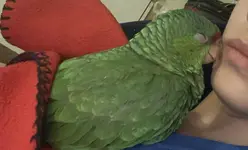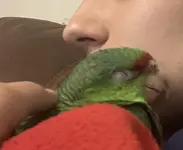Welcome! This forum is seriously great-- lots of sweet people with many good ideas! Glad you are here.
Here is a NOVEL of information that I copied and pasted from another "new bird owner" post. Sorry it's so long!!!
When you have a bird, any sort of heated mechanism (anything that heats or is intended to be heated) and contains PTFE/PFOA/PFCs/Teflon will be out of the question (and most things that heat up or are intended to be heated DO contain these chemicals)--This includes things like pots, pans, cupcake trays, cookie sheets, cake pans etc, but it will also things like include hair-dryers, straighteners, curling irons, curlers, rice-cookers, SLOW COOKERS, popcorn poppers, air fryers, microwave meals (including certain types of microwave popcorn), steamers, irons, ironing board covers, electric skillets, griddles, George Foreman Grills, drip trays, toasters, toaster ovens, poaching pans, electric blankets, humidifiers, heat lamps, SPACE HEATERS, Scotch Guard etc etc...Here 2 links about it:
https://www.ewg.org/research/canarie...on-kills-birds
To find out what contains PTFE/PFOA/PFCs/Teflon, you have to call and be a bit insistent about it over the phone (and in some cases, you won't get far--but sometimes it is a matter of how you ask). Almost always, it will take a few days (and numerous holds) for them to get back to you and you must provide the full chemical names, abbreviations and brand-names. Shopping when you have a bird is super annoying because cannot visually ID these chemical coatings, as they can be colored, transparent, or mixed into metal/fabric during the manufacturing process. Teflon and chemically similar products have killed birds on separate floors with the doors shut. Similarly, while DuPont claims that off-gassing only occurs at higher heats, there have been myriad bird deaths (even within academic circles) at temperatures well within the 300 degree F range! There is a reason they used canaries in coal-mines and it is because they die very easily due to even low levels of fumes of any sort. Some specific accounts:
https://www.ewg.org/research/canarie...-death-diaries
Here are the abbreviations and full spellings of the chemicals you need to ask about when inquiring about a product (give the name, spelling and abbreviation of each):
Teflon= common brand-name using the chemical types in question
PTFE= Polytetrafluoroethyline
PFOA= Perfluorooctanoic acid (sometimes known as C8)
PFCs= Perfluorinated chemicals
Sleep=essential to hormonal and immune function. Different species have different requirements, but 12 is pretty much the average. This means that someone must be there to cover and uncover the bird at the same time each night and that your home must be conducive to sleep.
Make sure you aren't using any unsafe products around the bird. This is pretty much everything with a scent (and some things without).
No perfume, carpet cleaner, flea shampoo, aerosols, solvents, air fresheners, paints, smoke of any kind, vaping, sunscreen, bugspray, candles of any kind (organic or non), insecticides, certain soaps/shampoos, fire-places, burning or heated oil/fat, self-cleaning ovens, gas and any household cleaners (e.g., bleach, windex, lysol, fabreeze, scrubbing bubbles, kaboom, pine-sol etc)...You will seriously have to re-think your entire home and your cleaning routine will change a ton.
NEVER use the self-cleaning oven function or try to season cast iron around birds.
The list goes on. Birds have VERY sensitive respiratory systems. Essential oils are also fairly unsafe due to their ability to be absorbed into the blood-stream and due to a bird's sensitive air sacs.
In terms of safe cleaning alternatives: White vinegar + water (as long as you don't heat it), grapefruit seed extract + water, baking soda (for scrubbing), some (but not all) natural cleaning products sold in pre-mixed formulas, and then avian-safe veterinary disinfectants, such as F10 SC (the yellow/clear concentrate has to be mixed with water but it is super safe and more effective than vinegar at killing bacteria etc).
Fumes make traveling with a bird complicated, as it is very unsafe to bring your bird with you into a location where teflon or chemical cleaners are being used. My bird does travel with me, but it is important to consider the safety of your final destination, as well as car temperature and any stops along the way (if you plan on bringing your bird inside).
I would recommend getting an air purifier (non-ozone producing/non-ionizing) to help with dust/mold etc (which can harm birds). Please note- a purifier will not protect birds from cigarette smoke, vaping fumes, teflon/ptfe/pfoa etc. It will only help increase the quality of the air to some extent. You cannot use unsafe chemicals around the bird just because you have a purifier.
Generally, you should only pet birds on the head/neck and you should not allow any shadowy spaces in the cage (boxes, bedding, crumbled paper, tents, blankets, low furniture, in clothing etc)...and so are tents/huts/hammocks etc. These things are hormonal triggers and they can cause health and behavior problems and snuggle huts can also entangle birds and cause blockages.
Birds hide illness like crazy, so there is nothing intuitive about their diseases. You have to be ready to study your birds poop and behavior daily, because even the slightest change can be a huge indicator. Blood work must be done yearly (at minimum) and should be done soon after you get a new bird. Birds can carry and spread deadly illnesses without showing any symptoms, so play-dates and exposure to boarding facilities etc come with risks of their own. PBFD, ABV and PDD are all very serious and very contagious diseases that can be spread by things like feather dust in the ventilation system. These diseases are also notorious for producing false negatives in infected but asymptomatic carriers (when tested).
Bottom line: make sure that you have a certified avian vet (CAV) near you. Exotics vets who see birds are not the same thing. If you don't have a CAV near you, your life will be much more anxiety-ridden than if you do (and the difference between a CAV and an exotics vet can mean the difference between life and death for your bird in certain instances).
Birds are very sensitive to temperature changes and drafts. Any temperature change of 10 degrees or more puts significant stress on their systems. If you have to take your bird out in the cold, make sure you carefully cover the cage and pre-warm the car. Also, make sure you don't have any air-fresheners in the car or vents blowing directly on the bird. Extreme heat can also be harmful. Over time, birds can adjust to a wide ranger of temperatures, but this adjustment has to take place over a long period of time. Anything too quick is going to shock their systems.
Dowel perches that are smooth/even in texture lead to a disease called bumble-foot. Textured perches prevent this---look into dragonwood, manzanita and pummice perches. There are numerous guides to appropriate sizing online.
Birds move in slow motion and especially and establishing real trust can take many months.
A baby bird will generally be friendly to all (much like a baby human), but teen and adult birds experience significant hormonal changes which impact their personality and preferences. Puberty is particularly bad in many cases. Although it passes, an adult bird will never be as nice as a baby and it will come with a whole new set of preferences, desires and rules.
It is very important not to engage in behaviors that will eventually be inappropriate for the bird as an adult, as this sets an unsustainable precedent. You must teach independence, refrain from allowing the bird to graft itself to you all day, do not spend excessive time with your bird due to the fact that they are a new and exciting new pet (because you will be expected to keep it up long-term), pet on head/neck only and do not provide your bird with access to fleece huts, huts in general, tents, boxes, blankets, pillows, bedding etc, ignore screams for attention and attend to the sounds you will be able to tolerate long-term, ignore biting when it happens and do not scold/react.



